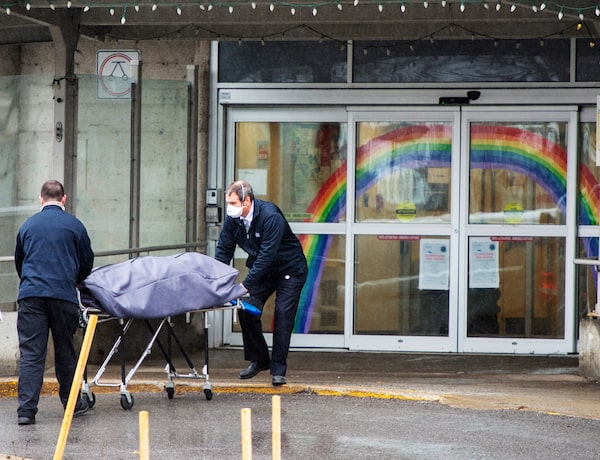
Funeral home workers remove a body from the Centre d'hebergement Sainte-Dorothee in Laval, Que. on April 13, 2020.Ryan Remiorz/The Canadian Press
As the pandemic struck a Quebec nursing home last year, officials made it harder to send ailing residents to hospital and repeatedly provided morphine rather than treat those with breathing problems, a coroner’s inquest heard Wednesday.
A nurse testified that the Sainte-Dorothée long-term care facility consistently administered morphine instead of attempting to prolong the life of elderly residents who were believed to have COVID-19.
“They didn’t all die but most did,” Sylvie Morin said.
Ms. Morin was an assistant chief nurse at Sainte-Dorothée, an LTC home north of Montreal where more than 100 residents died during the first wave of the pandemic last year.
“They made us put them all on the respiratory-distress protocol,” she testified.
She was alluding to a medical assessment tool where morphine, the sedative Ativan and scopolamine, an anti-nausea drug, are administered if a resident’s breathing troubles meet a number of criteria.
“It was like, they have respiratory distress, ‘Okay, we put them on the protocol.’ Morphine, scopolamine, Ativan,” Ms. Morin said.
“Which leads to death?” asked Patrick Martin-Ménard, a lawyer for the family of a deceased resident.
“Yes,” Ms. Morin replied.
She later clarified that “It’s not what kills the person. It makes them more comfortable. But with COVID, it was going so fast, I had never seen deaths happen so quickly. The person had symptoms, we tested, we got the results 24-48 hours later. A day later, they were dead. It wasn’t long.”
Mr. Martin-Ménard represents the family of Anna José Maquet, a 94-year-old who died suddenly at Sainte-Dorothée in 2020. According to her children, on the evening of April 2, she told them on the phone that she was feeling fine.
The inquest heard that, early the next day, she gagged while drinking a liquid, then threw up her medication at mid-morning. By 12:45 p.m., she had been put on morphine and died in the evening.
There is no evidence that Ms. Maquet contracted COVID-19. She was tested but the result has been lost, the inquest heard.
The testimony underlined the impact of provincial directives issued when the pandemic started. Under one of those directives, patients were transferred from hospitals to nursing homes and it was harder for them to be sent back.
The rules were aimed at protecting hospitals from being swamped with COVID-19 patients but instead made it more challenging for nursing homes. More than 4,000 seniors died in Quebec elder-care homes during the first wave.
A document filed at the inquest shows that the provincial Health Department sought to offload 80 per cent of hospital patients who didn’t need acute care, either by discharging them or sending them to LTC homes.
At the same time, families of LTC residents were contacted to revise their love ones’ level of care. “Should move towards C and D levels,” said a health-board planning document filed at the inquest.
Unlike care levels A and B, where patients receive medical attention to prolong life, at C and D levels, the priority is dispensing comfort care to relieve pain as a person approaches death.
Ms. Morin testified that her floor supervisor was readying for a large number of deaths.
“My unit leader, in early March, was agitated,” Ms. Morin said. “She was saying if we have COVID, it’s going to empty the LTC. She had 250 death certificates, 250 forms for the respiratory-distress protocol. I looked at it and I said, ‘come now, they’re not all going to die’. But it was all set up ahead of time.”
Another nurse, Agnieska Mroz, testified that she witnessed a Sainte-Dorothée resident struggling to breathe while staff couldn’t send her to hospital because of the care-level restrictions.
The resident’s family eventually called 9-1-1 themselves to get an ambulance to take the woman to hospital.
Our Morning Update and Evening Update newsletters are written by Globe editors, giving you a concise summary of the day’s most important headlines. Sign up today.